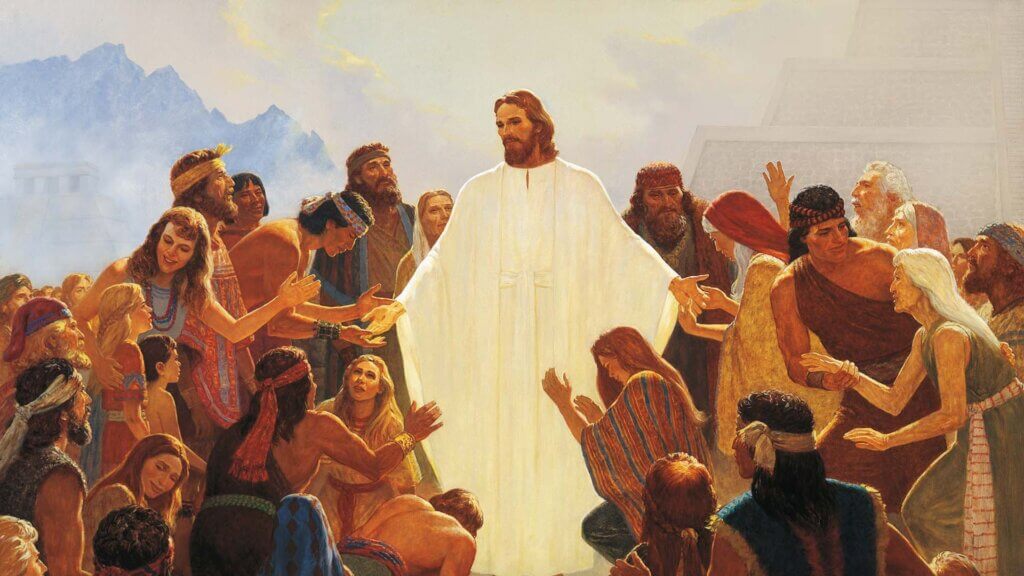In his twin prophetic discourse to the Nephites at Bountiful in 3 Nephi 21 that is based on the words of Isaiah, Jesus again shows the interplay between the end-time Gentiles and house of Israel; that is, between God’s people who are of the covenant today—the Latter-day Saints—and the Jews, Ten Tribes, and Lehi’s descendants. By again using the literary pattern of an extended chiasm, Jesus infuses meanings not otherwise apparent. Here is a breakdown of his discourse:
- a—The dispersed house of Israel gathers together and is established in Zion (21:1)
- b—The Book of Mormon comes forth from the Gentiles to the house of Israel (21:2–3)
- c—The Gentiles are established in America as a free people—after the house of Israel defaults—by the power of the Father (21:4–6a)
- d—Some Gentiles, who do not harden their hearts, repent and come unto Christ; they are numbered among the house of Israel (21:6b)
- e—The Father fulfills his covenant with the house of Israel (21:7)
- f—The kings of the Gentiles shut their mouths when new things are preached to them (21:8; compare Isaiah 52:15)
- g—The Father does a great and marvelous work among the Gentiles (21:9a)
- h—Many among the Gentiles do not believe the great and marvelous work when it is declared to them (21:9b)
- g—The Lord heals his servant after he is marred by the Gentiles (21:10)
- g—The Father does a great and marvelous work among the Gentiles (21:9a)
- f—The Lord’s servant brings forth the words of Christ to the Gentiles by the Father’s power (21:11a–c)
- f—The kings of the Gentiles shut their mouths when new things are preached to them (21:8; compare Isaiah 52:15)
- e—The Gentiles are cut off from the Lord’s covenant with the house of Israel and are trodden down by them (21:11d–21)
- e—The Father fulfills his covenant with the house of Israel (21:7)
- d—Some Gentiles, who do not harden their hearts, repent and hearken to the words of Christ; they are numbered among the house of Israel (21:22)
- d—Some Gentiles, who do not harden their hearts, repent and come unto Christ; they are numbered among the house of Israel (21:6b)
- c—The house of Israel is established; they gather to the New Jerusalem; the power of heaven and the Lord abide in their midst (21:23–25)
- c—The Gentiles are established in America as a free people—after the house of Israel defaults—by the power of the Father (21:4–6a)
- b—The gospel comes forth from the Gentiles to the house of Israel (21:26a)
- b—The Book of Mormon comes forth from the Gentiles to the house of Israel (21:2–3)
- a—The Lord’s dispersed people gather home to the land of their inheritance (21:26b–29)
Jesus’ twin discourse in 3 Nephi 21 repeats essentially the same scenario as his first discourse in 3 Nephi 20, except that the second dwells more on the end-time Gentiles than the house of Israel. As before, although the Gentiles receive an opportunity to be blessed under God’s covenant with the house of Israel, in the end many fail to repent of evil (3 Nephi 21:6, 14). At that point, the house of Israel treads them down (3 Nephi 21:12–21).
A turning point occurs when God’s end-time servant conveys the words of Christ to the Gentiles and to the spiritual kings of the Gentiles (3 Nephi 21:8–11). As the structure’s centerpiece shows (see h), many do not believe the true nature of the Lord’s great and marvelous work but instead mar the messenger. These disbelievers make up a majority of the Ephraimite Gentiles. While at first the gospel and the Book of Mormon go from them to the house of Israel (3 Nephi 21:4–5), in the end they themselves by and large reject the mission of God’s servant and are “cut of” from being God’s people (3 Nephi 21:10–12; cf. 2 Nephi 28:32).
On the other hand, the Father reestablishes his covenant with the house of Israel (3 Nephi 21:4, 7). This implies that the house of Israel accepts the words of Christ that his servant brings forth. The words of Christ are those Mormon could not tell us that are on the large plates of Nephi (3 Nephi 26:1–11), not the small plates from which the Book of Mormon is taken. To the house of Israel, the words of Christ come as “good tidings” (3 Nephi 20:40; cf. Isaiah 52:7). As they accept the gospel, they gather from exile and build the New Jerusalem; Christ himself and the power of heaven dwell in their midst (3 Nephi 21:24–29). The Gentiles who do repent are numbered with them and inherit the land of America (3 Nephi 21:22).
(Originally appeared in Avraham Gileadi, The Last Days: Types and Shadows from the Bible and the Book of Mormon, Deseret Book, 1991, pp 88–96)












